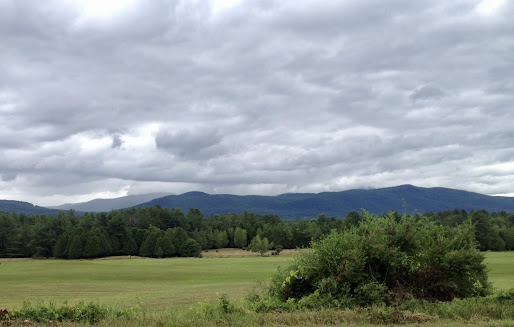November 25.
This morning the ground is again covered with snow, deeper than before.
In the afternoon walked to the east part of Lincoln.
Saw a tree on the turnpike full of hickory-nuts which had an agreeable appearance.
Saw also quite a flock of the pine grosbeak, a plump and handsome bird as big as a robin.
When returning between Bear Hill and the railroad, the sun had set and there was a very clear amber light in the west, and, turning about, we were surprised at the darkness in the east, the crescent of night, almost as if the air were thick, a thick snow-storm were gathering, which, as we had faced the west, we were not prepared for; yet the air was clear.
November 22, 2021
That kind of sunset which I witnessed on Saturday and Sunday is perhaps peculiar to the late autumn. The sun is unseen behind a hill.
Only this bright white light like a fire falls on the trembling needles of the pine.
When surveying in the swamp on the 20th last, at sundown, I heard the owls.Hosmer said: “If you ever minded it, it is about the surest sign of rain that there is. Don't you know that last Friday night you heard them and spoke of them, and the next day it rained?”
This time there were other signs of rain in abundance. But night before last,” said I, “when you were not here, they hooted louder than ever, and we have had no rain yet.”
At any rate, it rained hard the 21st, and by that rain the river was raised much higher than it has been this fall.
H. D. Thoreau, Journal, November 25, 1851
Saw a tree on the turnpike full of hickory-nuts which had an agreeable appearance. See
November 27, 1857 ("Was struck by the appearance of a small hickory near the wall, in the rocky ravine just above the trough. Its trunk was covered with loose scales unlike the hickories near it and as much as the shagbark; but probably it is a shaggy or scaly-barked variety of
Carya glabra. [
Carya glabra – pignut hickory]. The husk is not thick, like that of the shagbark, but quite thin, and splits into four only part way down. The shell is not white nor sharply four-angled like the other, but it is rather like a pignut.");
January 7, 1860 ("See, at White Pond . . . a pignut hickory, which was quite full of nuts and still has many on it.") See also
November 26, 1860 ("Better for us is the wild strawberry than the pineapple, the wild apple than the orange, the hazelnut or pignut than the cocoanut or almond, and not on account of their flavor merely, but the part they play in our education.");
November 28, 1860 ("The rich man's son gets cocoanuts, and the poor man's, pignuts; but the worst of it is that the former never goes a-cocoanutting, and so he never gets the cream of the cocoanut as the latter does the cream of the pignut")
A flock of the pine grosbeak, a plump and handsome. See
December 24, 1851 (“Saw also some pine grosbeaks, magnificent winter birds, among the weeds and on the apple trees; . . .when they flit by, are seen to have gorgeous heads, breasts, and rumps, with red or crimson reflections.”);
December 11, 1855 ("When some rare northern bird like the pine grosbeak is seen thus far south in the Winter, he does not suggest poverty, but dazzles us with his beauty.");
July 15, 1858 ("Saw two pine grosbeaks, male and female, . . .the male a brilliant red orange, —neck, head, breast beneath, and rump,—blackish wings and tail, with two white bars on wings. (Female, yellowish.) ")
The sun had set and there was a very clear amber light in the west, and, turning about, we were surprised at the darkness in the east, the crescent of night, almost as if the air were thick, . . yet the air was clear. See
November 25, 1857 ("I shiver about awhile on Pine Hill, waiting for the sun to set. Methinks the air is dusky soon after four these days. . . . There is the sun a quarter of an hour high, shining on it through a perfectly clear sky, but to my eye it is singularly dark or dusky. And now the sun has disappeared");
November 27, 1853 ("The days are short enough now. The sun is already setting before I have reached the ordinary limit of my walk."); November 28, 1859 ("We make a good deal of the early twilights of these November days, they make so large a part of the afternoon.")
That kind of sunset which I witnessed on Saturday and Sunday is perhaps peculiar to the late autumn. See note to
November 22, 1851 ("The light of the setting sun, just emerged from a cloud and suddenly falling on and lighting up the needles of the white pine.");
November 23, 1851 ("Another such a sunset to-night as the last."); See also
November 25, 1858 ("You are surprised, late these afternoons, a half an hour perhaps before sunset, . . . to see the singularly bright yellow light of the sun reflected from pines. . .through the clear, cold air, the wind, it may be, blowing strong from the northwest.. . . and when I look round northeast I am greatly surprised by the very brilliant sunlight of which I speak, surpassing the glare of any noontide, it seems to me");
When surveying in the swamp on the 20th last, at sundown, I heard the owls. See
November 18,1851 ("Surveying these days the Ministerial Lot. Now at sundown I hear the hooting of an owl,--
hoo hoo hoo, hoorer, hoo. . . .I heard it last evening. It is a sound admirably suited to the swamp and to the twilight woods.")










